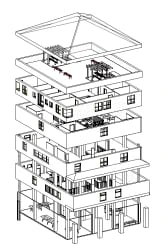Crestview Towers
/2024
Twin 45-storey concrete towers, cinched together by a glass-walled skybridge lounge, offer housing options from micro-studios to family duplexes. Stepped green commons punctuate every fifth floor, promoting neighbourly interaction while extruded aluminium ‘sails’ sculpt an unmistakable skyline profile and temper solar gain.
Project Gallery

Timescales
A compressed 30-month master schedule allocated five months to intensive wind-tunnel studies, twelve months to erect the podium and dual cores, and rapid slip-form climbs thereafter.
The entire weathering-steel skybridge truss was hoisted and bolted during a meticulously planned 48-hour road closure at month 18, minimising urban disruption.
Phased residential hand-over commenced at month 27, with full occupancy certificates secured at month 30 after final inspections and snagging.
Objectives
Deliver highly adaptable unit layouts, craft an iconic skyline silhouette, and create a glowing skybridge lounge that serves as a social beacon visible across the city.
Allocate 30% of apartments to long-term affordable housing, attain LEED Gold certification, and integrate on-site grey-water recycling to lower utility bills.
Insert lush double-height green commons on every fifth level to foster a vibrant vertical neighbourhood and encourage community interaction.
Materials
Robust reinforced-concrete cores brace post-tensioned floor slabs, while the façade blends high-performance glazing with sculptural extruded aluminium ‘sails’ for solar control.
The skybridge consists of a polyhedral weathering-steel truss wrapped in low-iron glass, and the podium uses reconstituted stone rainscreens echoing heritage masonry.
Interior finishes prioritise durability: terrazzo floors, FSC-certified maple veneer doors, recycled-rubber gym flooring, and new carbon-negative carpet tiles.
Challenges
Operating dual tower cranes within a restricted flight corridor required night-time concrete pours and meticulously sequenced lift plans approved by aviation authorities.
Higher-than-modelled wind accelerations led to the late procurement of a 600-tonne tuned mass damper craned through a temporary roof hatch.
Acute façade-installer labour shortages prompted a rapid training partnership with local colleges, using mock-up rigs to skill new apprentices on site.